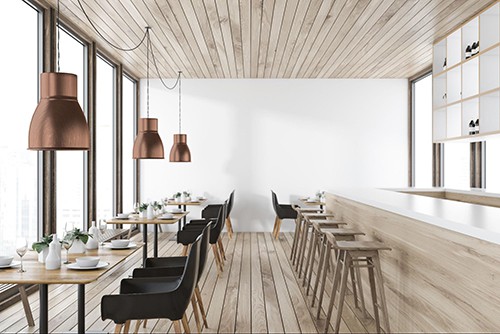How To Take Inventory For Your Bar: 5 Expert Tips
Many managers feel that bar inventory is a complex, time-consuming process that ...

Want to learn how to open a bar but feel overwhelmed at the prospect of starting your own business? Breaking things down into smaller steps can help.
In this article, we discuss how to prepare, set up, and operate your bar for potential success.

The first step to starting a bar may have nothing to do with business at all and everything to do with your own priorities.
Before you set out to open a beverage service business, take the time to decide what you want your work life and your personal life to look like when the bar is up and running.
Can you create the work-life balance you crave through this type of entrepreneurial effort?
Running a bar is hard work that often demands long hours, so as you’re examining your priorities, ask yourself other introspective questions, such as:
Finding honest answers to questions like these can help you decide if you want to continue with the process of starting a bar or if you want to concentrate your entrepreneurial efforts elsewhere.
One of the best ways to learn how to start a bar is to work in one first. You’ll experience firsthand what it takes to keep a bar going and gain valuable experience in basic business practices, like:
You can then transfer the lessons you learn working for someone else to your own unique venture.
Before you get too deep into the process of learning how to start a bar, take the time to research state and local health codes.
These regulations can sometimes be extensive, rigorous, and expensive to implement, so be sure you understand the hoops you may have to jump through to operate your business. It’s also a good idea to seek legal counsel.
In some cases, one of the most difficult parts of the entire process is coming up with a name for your fledgling business. That’s why we recommend brainstorming early so you have plenty of time to settle on an option that you like.
You’re also going to need a business name when you start filling out forms in the setup phase of the process. Redoing all the paperwork because you decided to switch names can be expensive, not to mention labor intensive.

There are many different types of bars — sports bar, nightclub, or neighborhood watering hole (just to name a few). Each type comes with its own pros and cons and its own set of operating costs.
While you’ll certainly want to weigh the pros and cons, you’ll want to give extra attention to the latter variable so you know what it takes to run the bar and make it successful.
For example, if you choose to open a sports bar, you’ll likely need a lot of high-definition TVs (both large, medium, and small), a good sound system, and access to a wide variety of sports from around the world.
If, on the other hand, you choose to open a neighborhood watering hole, you may be fine with one or two TVs and just the local channels or a basic cable package.
With the neighborhood watering hole, you would likely have less upfront expense for TVs and setup as well as less ongoing expense from cable sports package subscriptions.
This is a very basic example of how just one aspect — the “entertainment system” — of two different bars can dramatically affect operating costs in both the short- and long-term.
If you want to do everything you can to keep your new business in the black, you’ll need to learn how to take inventory for your bar.
What’s more, taking inventory for a bar goes beyond just counting the bottles of liquor on the wall and in the storage room. You’ll actually need to keep track of the amount of liquid in each bottle.
Why is this important? Because monitoring the liquid in each bottle can help you control costs, give you insight into how your bar is running, and help you stay on the road to profitability and success.
The most accurate way to take inventory for a bar is to weigh the bottles and their contents on a regular schedule (e.g., every two days, every week, every two weeks) to see how much you use in that period of time.
With that information, you can adjust your purchasing and bottles on hand to better serve your customers’ needs and keep expenses as low as possible.
For more information on monitoring your bar inventory, check out this article from the Sling blog: How To Take Inventory For Your Bar: 5 Expert Tips.
This may seem like a no-brainer, but we’ll mention it anyway because it’s an essential part of learning how to open a bar: make sure you know how to mix drinks.
Sure, you can pop the top on a bottle of beer and slide it down the bar without spilling a drop, but can you mix an Old Fashioned from memory in two minutes or less?
What about a Gimlet or a Side Car or an espresso Martini?
Even if you’ve got those drinks down pat, there’s a pretty high chance that one of your customers will come in and order something novel and unique.
To keep everything running smoothly and your regulars happy, start researching and learning about drinks and their recipes before you open your doors.
With very few exceptions, running a bar is largely an evening activity. The peak hours for most bars are 5:00 p.m. to 2:00 a.m. or later (depending on local laws and ordinances).
So, for the most part, running a bar requires you and your team to work some parts of the standard second and third shift (i.e., 4:00 p.m. to 12:00 a.m. and 12:00 a.m. to 8:00 a.m.).
If you’ve been working first shift (i.e., 8:00 a.m. to 5:00 p.m.) all your life, the transition can be difficult.
If you’re not working a day job while you learn how to open a bar, consider adjusting your wake/sleep schedule to conform with your bar’s regular hours of operation.
So, if your bar will be open from 4:00 p.m. to midnight, consider working through the first two sections of this list during those hours so you can train your body to be active in the evening and into the night.

Every business needs a plan. Your bar is no different.
As you develop your plan, it can be helpful to include a wide variety of information, like:
Once complete, a well-structured business plan can serve as a road map that shows you exactly what you need to do to get your bar up and running.
Successful bars often live and die by the real estate maxim, “location, location, location.” As you explore your options, be sure to consider details such as:
You may be excited to get started, but resist the urge to pick a less-than-ideal location for your new bar. Look long enough and the right place will come along.
Registering your bar usually starts with deciding how you’re going to organize the operation for legal and tax purposes. Again, this list is not intended as legal advice, and you should consult your counsel for more information.
Options include:
After you settle on the type of business you’re going to run, you’ll need to register with the IRS, the federal government, and state and local authorities in order to obtain the necessary licenses and permits.
Regardless of the type of legal and tax entity you choose, it’s a good idea to open a separate bank account just for the business.
Keeping your personal and business finances separate can help with a wide variety of activities, including:
It may seem like a waste of time to open a checking account for your new bar, but doing so might save you time and effort down the road and come tax time.

Opening a bar can be an expensive endeavor. From the decor to the seating to the liquor itself, everything costs money. You can reduce the costs significantly by purchasing used equipment, but the price tag is still likely going to be up there.
So, unless you’ve been saving for most of your life, you’re going to need to pursue at least a little bit of financing to get things started.
That could be as “simple” as taking out a loan from a bank or as complicated as taking on partners or lining up investors.
Make sure you have the financing in place and the money in the bank before you get too deep into purchasing for your bar.
If you start buying things on credit (without the funds to pay those bills rather quickly), the interest rates can quickly eat into the money you do have on hand and severely limit whether or not your bar turns a profit.
Before you serve your first drink, you’re going to need to have a liquor license on hand.
Depending on where you live and how many other bars there are in the area, the process can take a long time to work through and can even dictate whether or not you’ll be able to open the bar in the first place.
In many locations, liquor license availability is determined by looking at the total population of an area and the number of existing liquor licenses for that population.
So, for example, a city may allow 10 licenses for every 10,000 people inside a predetermined set of boundaries. If you want to put your bar in a specific area and all ten licenses are already in use, you may not even get permission to serve alcohol.
Get started applying for a liquor license right away — especially before spending money on other big-ticket items — because said license can dictate whether or not you’ll even be allowed to serve alcohol once your bar is up and running.
You don’t want to pay for a space, get everything decorated, and purchase beer, wine, and spirits only to discover there are no licenses available and you can’t serve the stock you’ve got.
While you may not need a written budget right away, chances are that banks and investors are going to want at least a basic breakdown of what you plan to spend to keep your bar running.
Such a budget can also help you control costs once things get going so you don’t spend all the profits you bring in.
Be sure to budget for utilities (e.g., electricity, gas, internet, etc.), supplies (e.g., cleaning chemicals, rags, brooms, mops, etc.), dishware, uniforms, and tools (just to name a few).
Once you’ve built your budget, and your bar is up and running, do your best to stick with what you’ve written.
Many bars also offer food to go with the drinks they serve. If you choose to go this route — even with only a few items — you’re going to need a menu.
Keep in mind that you may also want to put together a beverage menu to highlight the beer, wine, and specialty drinks you offer.
For more information on creating the best menu possible, check out these articles from the Sling blog:
Though these articles are written with restaurants in mind, the concepts and principles apply to any establishment that is going to serve food and drink — including your bar.

Bars require a lot of equipment: coolers, freezers, taps, bar tops, tables, chairs, mirrors, POS equipment — the list goes on and on.
Some of this equipment can get very expensive very quickly because of health and safety regulations. You may find some deals online, but it’s always a good idea to purchase high-quality equipment so you don’t run into problems down the road.
That includes the software you’re going to use to schedule and organize your team.
The right program can often mean the difference between a smooth workday and one that’s rife with problems, confusion, and no-show employees.
Hiring and scheduling employees may seem like an impossible task at first, but with the help of modern technology, you’ll be a pro in no time.
The Sling software suite is particularly useful for tasks like:
Once you’ve hired and scheduled the best team for your bar, you can use the Sling app to communicate, assign tasks, get a handle on labor costs, and even democratize future scheduling.
Right from day one, encourage your team to focus on customer service and how they can best serve the patrons who walk through your doors.
Since you’re not necessarily “producing” anything (other than high-quality mixed drinks, of course), bar customers may often come for the atmosphere and the friendly service they receive from your employees.
Whether you started advertising your bar before you opened the doors or waited to market your establishment until the drinks were flowing, now may be the time to kick that activity into high gear.
As you consider ways to advertise and market your bar, don’t just focus on the most expensive options. There are plenty of ways to get the word out that only cost a fraction of what you might spend on the big three (TV, radio, and print media).
Try these relatively inexpensive advertising alternatives to get things started:
Get creative with your marketing efforts to reach as much of your target audience as possible.

When it comes to how to open a bar, you need the right tools. As we mentioned earlier, incorporating the right scheduling software into your workflow from the start can help your new business stay on the road to success.
And when it comes to organizing, managing, and optimizing your workforce, Sling is the preferred choice of thousands of bars and restaurants.
The Sling app can help you save countless hours each week that you can then dedicate to learning how to open a bar, growing your business, and making your dream a reality.
For more free resources to help you manage your business better, organize and schedule your team, and track and calculate labor costs, visit GetSling.com today.
See Here For Last Updated Dates: Link
This content is for informational purposes and is not intended as legal, tax, HR, or any other professional advice. Please contact an attorney or other professional for specific advice.
Schedule faster, communicate better, get things done.